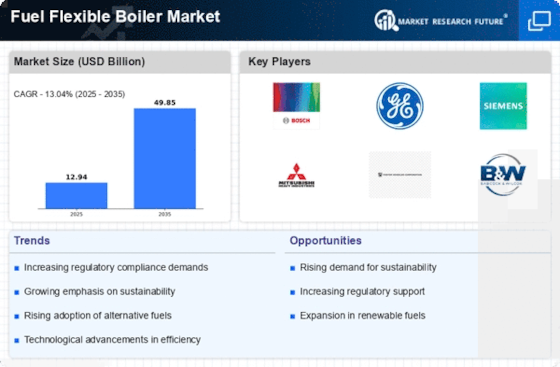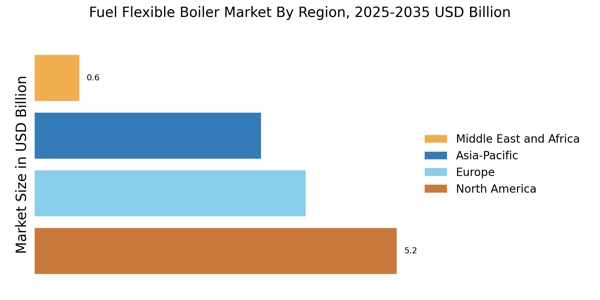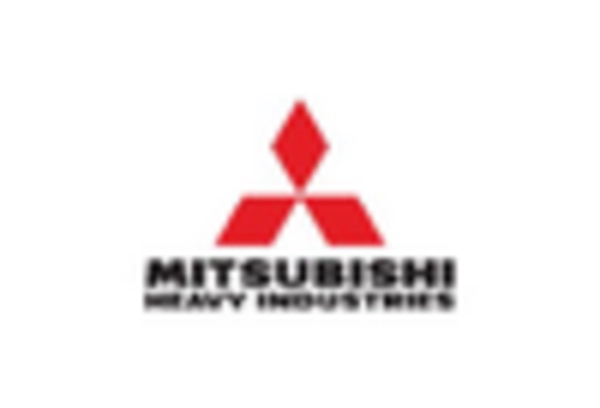Rising Energy Demand
The Fuel Flexible Boiler Market is experiencing a surge in demand due to the increasing energy requirements across various sectors. As industrial activities expand and urbanization accelerates, the need for efficient and adaptable energy solutions becomes paramount. According to recent data, energy consumption is projected to rise by approximately 30% by 2040, necessitating the adoption of technologies that can utilize multiple fuel sources. Fuel flexible boilers, capable of operating on natural gas, biomass, and other renewable fuels, are well-positioned to meet this demand. This adaptability not only enhances energy security but also aligns with sustainability goals, making these boilers a preferred choice in the evolving energy landscape.
Environmental Regulations
The Fuel Flexible Boiler Market is significantly influenced by stringent environmental regulations aimed at reducing greenhouse gas emissions. Governments worldwide are implementing policies that encourage the transition to cleaner energy sources. For instance, regulations mandating lower emissions from industrial boilers are driving the adoption of fuel flexible technologies. These boilers can switch between fossil fuels and renewable options, thus complying with emission standards while maintaining operational efficiency. The market is expected to grow as industries seek to avoid penalties associated with non-compliance. In fact, it is estimated that the market for fuel flexible boilers could expand by 15% annually as companies invest in cleaner technologies to meet regulatory requirements.
Technological Advancements
The Fuel Flexible Boiler Market is benefiting from rapid technological advancements that enhance the efficiency and performance of boilers. Innovations in combustion technology, control systems, and materials science are enabling the development of boilers that can seamlessly switch between various fuel types. These advancements not only improve energy efficiency but also reduce operational costs. For example, modern fuel flexible boilers can achieve efficiencies exceeding 90%, which is a significant improvement over traditional systems. As industries increasingly prioritize cost-effective and sustainable solutions, the demand for technologically advanced fuel flexible boilers is likely to rise, further propelling market growth.
Economic Incentives for Renewable Energy
The Fuel Flexible Boiler Market is positively impacted by economic incentives aimed at promoting renewable energy adoption. Governments and organizations are increasingly offering financial support, tax credits, and grants to encourage the use of renewable fuels in energy production. These incentives make fuel flexible boilers more attractive to businesses looking to reduce their carbon footprint and operational costs. As a result, the market for fuel flexible boilers is projected to grow, with estimates suggesting a compound annual growth rate of around 12% over the next five years. This trend indicates a strong alignment between economic incentives and the transition towards sustainable energy solutions.
Shift Towards Decentralized Energy Systems
The Fuel Flexible Boiler Market is witnessing a shift towards decentralized energy systems, driven by the need for energy resilience and reliability. As businesses and communities seek to reduce their dependence on centralized power grids, fuel flexible boilers offer a viable solution. These systems can operate independently or in conjunction with renewable energy sources, providing a stable energy supply. The trend towards decentralization is expected to grow, with projections indicating that decentralized energy systems could account for over 40% of total energy generation by 2030. This shift presents a substantial opportunity for the fuel flexible boiler market, as more entities look to invest in adaptable and reliable energy solutions.


















